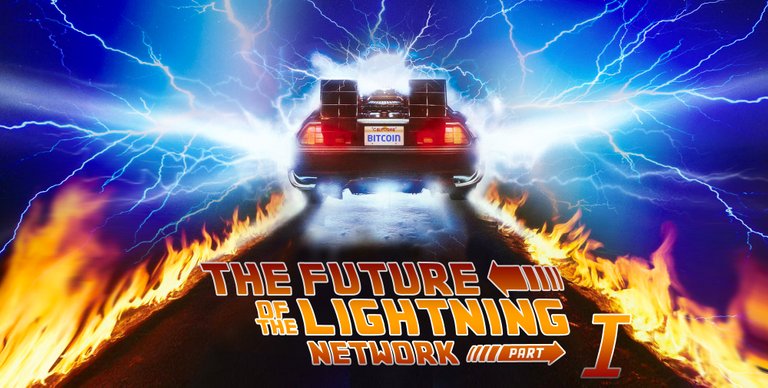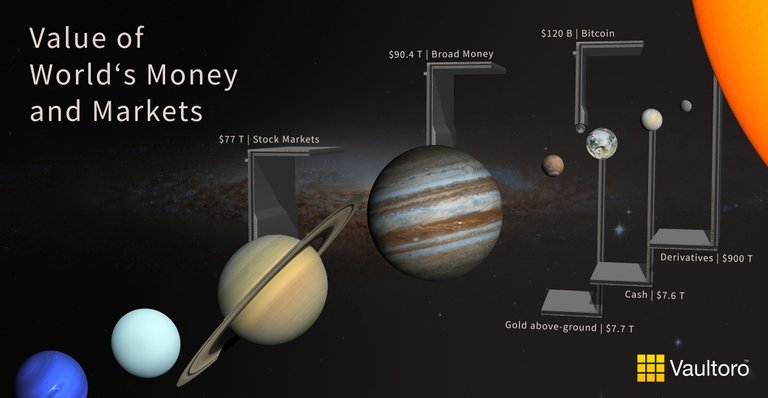
Introduction - The Future of Digital Trade
Will Bitcoin be the future of money? Will Bitcoin Lightning Network micropayments be the new digital cash?
Many rumours say that in the year 2030 more than 10% of global gross domestic product (GWP) will be exchanged using blockchain technology.
Here is a visualisation that outlines the massive potential of future payment systems using innovative cash systems like Bitcoin.

Visualization of celestial bodies in proportion to world's monies and markets.
Please note that at the time of writing, the combined market cap of all Altcoins is fairly identical to the current market cap of Bitcoin. Just imagine a second moon for all other blockchain projects :)
However, you will find it hard to estimate these measures, because it is just the value of one unit of account in reference to another. Bitcoin could make up 10% of GWP spending at an exchange rate of $1, $1000, or $1,000,000 depending on how often they get spent. You could, in theory, fuel the total $80T GWP with a single bitcoin (or Dollar, or Bolivar) if every party spent it very quickly and in the right order. But we have seen that Bitcoin went slower and slower and has had hard times to compete with money settlement technologies like Visa, Paypal and co. The Lightning Network aims not only to reduce transaction fees but also the transaction time. Most economists agree that the velocity of money is a key measure for economic activity and trade. As the nominal supply of Bitcoin is limited there are three options to increase the velocity of settlements:
- Make the Bitcoin Blockchain faster (increase block size, reduce block time, sharding, etc. )
- Use complementary cryptocurrencies or off-chain database layers (using exchange platforms, batching, etc.)
- Use second layer networks like the Lightning Network or Sidechains
From a technical point of view, faster or instant transaction will also enable a large number of micropayment applications. We've already seen the easy-to-use Y'alls app, where you pay a small fee for reading and interacting with blog articles. This would be very impractical with first-layer chains. Logically, nobody wants to wait 60 minutes before the article is available for reading. A second blind spot of ordinary digital transactions is the "dust limit". It is not economically viable to send less than 500 Satoshis over the main chain. The entire amount would then vanish as transaction fee or not be included in the next blocks at all.
The interview - How Lightning could affect your Daily Life in 2030?
We've asked different experts in the space about the 'Future of the Lightning Network' and how it could affect your daily life in 2030.
Our first interview partner was involved in the development of Bitcoin from the very beginning. Jeff Gallas has been an active member of the Berlin Bitcoin scene since 2011 and supports the community in making Lightning technology mature and adaptable. His startup Fulmo aspires to be a technology hub for developers and related professionals.
Here's the interview:
Hey Jeff! The Lightning Network is growing fast and more and more people are using it. How could the Lightning Network affect your daily life in 2030?
The LN will boost the trends that have been started by Bitcoin. Money and assets will be able to move faster and with less friction on a global scale. Most of the innovations will happen in the background, so the majority of people won't realize that they are using Bitcoin and the Lightning Network.
What are the most promising applications that Lightning could make possible?
The obvious answers are IoT applications, machine to machine payments and frictionless micropayments. I think that the Lightning Network not only solves a couple of existing problems but opens Bitcoin to a whole new world of innovation. The Lightning Network is another platform for permissionless innovation - the kind of innovation that's sometimes done "because we can", and not to solve a specific problem. I see the Lightning Network as a great incubator platform.
How would you personally like to see people using the LN in 2030?
From what we can say today, it'll probably run in the background. Most people won't know or need to know what's happening and that Lightning is making their particular use cases possible.
Which are the downsides, risks and uncertainties for the Lightning Network in the future?
The Lightning Network is an experiment built on an experiment. Either Bitcoin and Lightning theoretically can still fail, but every passing minute makes them stronger and less likely to do so. There are still a lot of hard engineering problems to be solved on Lightning, we're barely in the beta phase. There are a lot of great improvements coming - atom multi-path payments, splicing, watchtowers, improved routing, to name a few. But building all of this takes time and patience.

What are effective strategies to push the adoption of Bitcoin and Lightning?
My personal strategy which is in line with my personal skills is the #LightningHackday. My company, Fulmo, has created the Bitcoin Lightning Network Hackday as a platform to learn, teach, tinker with and build the Lightning Network. We are bringing together engineers, developers, designers and Bitcoin users to strengthen the community, exchange ideas and accelerate the development. We need to build the infrastructure first, and once it's solid, the masses will come. So education and community are two important aspects. But there are many other ways as well.
Lightning is a complete non-governmental project. Should governments intervene?
No.
If no, how we protect the ecosystem from governmental intervention?
We are working on a frontier. Things change at a rapid pace. Today's protections are tomorrow’s borders and limitations. Most people involved know the risk, which is expressed with the #reckless meme.
Outlook
This was the first episode of a series of expert interviews on the future of the Lightning Network. Next week we present an interview with René Pickhardt. He is very active in researching and disseminating the technical basics of the Lightning Network and we are very happy to have him as an interview partner.
You can meet Jeff and René this weekend at the Hackday in Berlin. We at Vaultoro will also be attending and are proud to be one of the main sponsors of Lightning Hackday #3 on August 31 and September 1.
Can't you make it to Berlin? Then don't worry. The Vaultoro Media Team will provide a live stream of keynote speakers exclusively for the upcoming event.
More information at https://lightninghackday.fulmo.org.
This article was originally published in the Vaultoro Blog.

Congratulations @vaultoro! You received a personal award!
You can view your badges on your Steem Board and compare to others on the Steem Ranking
Vote for @Steemitboard as a witness to get one more award and increased upvotes!